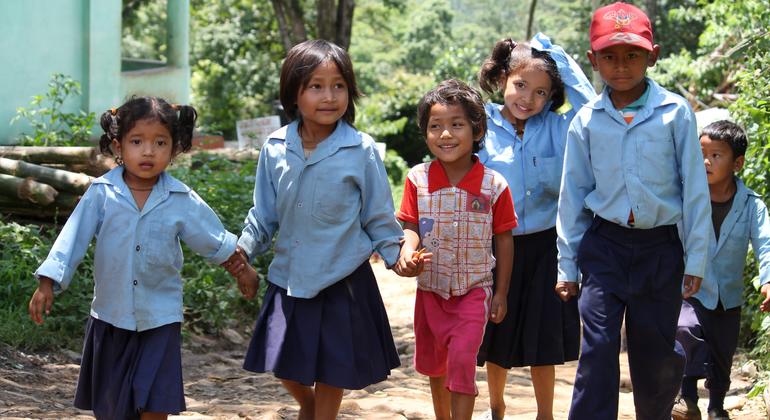
“Inequality. Hunger. Poverty. Weak infrastructure. Competition for dwindling resources. Insecurity and conflict,” Secretary-General António Guterres elaborated in his statement to the Fifth LDC (LDC5) Conference in the General Assembly Hall.
“The hopes, dreams, lives and livelihoods of one-eighth of humanity rest between the pages of the Doha Programme of Action (DPoA),” he added, zeroing-in on the “lifelines” it provides to help short-term LDC recovery, achieve the Sustainable Development goals (SDGs) in the medium term, and “develop and prosper” over the long-term.
Rework global financial system
Developing countries need to invest in sectors that reduce poverty and increase resilience, such as job-creation, social protection, food security, universal healthcare, quality education and digital connectivity, said the top UN official.
However, he added that LDCs are up against a “morally bankrupt global financial system,” designed by the rich and powerful to benefit themselves that sustains inequalities, rather than fostering development.
“This must change,” upheld the UN chief, flagging that LDCs require “urgent debt relief, restructuring and cancellation, in some cases”.
He said that they should be able to borrow at a low cost, be protected in times of crisis and receive more liquidity.
“And we need to create a fair tax system and combat illicit financial flows to re-invest some of the massive pockets of global wealth into people and countries who need it most,” underscored Mr. Guterres.
Structural transformations
Most of LDC’s economic growth is linked to natural resources or extractive sectors that are highly volatile in the short-term and vulnerable to fluctuating commodity prices, marketplace whims, and the impacts of climate change, Mr. Guterres explained.
Moreover, they are inhibited by poor education and training opportunities for workers, weak physical infrastructure, and lack of access to productivity-enhancing technology – all made far worse by COVID.
“LDCs need structural transformation support – now,” asserted the UN chief. “They need support to increase their participation in global value chains – now”.
This means investing in a healthy, educated and skilled workforce to drive economic growth; modernizing infrastructure and transportation networks; transforming extractive sectors and creating greener jobs; and promoting “open and fair-trade rules, so all countries can compete on a level playing field,” he outlined.
Climate action
Although they did not cause the climate crisis, LDCs are living with its worst impacts.
The Secretary-General cited the latest Intergovernmental Panel on Climate Change (IPCC) report, which showed how deaths from floods, droughts and storms have been 15 times higher in the most vulnerable countries and regions.
“In areas of high vulnerability around the globe – home to 3.6 billion people – over 100 climate risks will become more severe. Some will be irreversible,” he said.
Turning promises into reality
LDCs need “a massive boost” in technical and financial for a just transition to renewable energy and green jobs and to “build resilience against the impacts already battering them,” Mr. Guterres continued, urging development banks to urgently work with Governments to “design and deliver bankable projects”.
“We need to see 50 per cent of climate finance going to adaptation, and reformed eligibility systems so vulnerable nations can access it,” he argued. “And developed countries must deliver on their $100 billion climate finance commitment to developing countries this year”.
“Promises must turn into reality.”
Peace and security
The world today faces the highest number of violent conflicts since 1945 – with LDC’s representing “the lion’s share of these hotspots,” the UN chief pointed out.
“Peace and security cannot take hold in an absence of development. Nor can development take hold in an absence of peace and security,” he explained.
Nor can it exist in countries that perpetuate historical injustices, inequalities and systematic oppression or where basic services like health, education, security and justice are lacking.
“My proposed New Agenda for Peace calls on the global community to work as one…to address the roots of violent conflicts by investing in development” and includes a New Social Contract covering universal health coverage; social protection; education and training; and inclusive institutions and justice systems accessible to all, the top UN official said.
Allegiance pledged
And across these lifelines and the entire DPoA, he pledged that LDCs can count on “the total commitment of the entire UN system”.
“We are proud to be on this journey with all of you as we put the needs of the Least Developed Countries where they belong,” he said.
“First in our plans. First in our investments. And always first in our actions.”
About LDC5
LDC5 is being held in two parts: The first at UNHQ in New York on 17 March 2022 at which adoption of the Doha Programme of Action will be considered.
The second part will be held in Doha from 5-9 March 2023, where world leaders will gather with civil society, the private sector, young people and more to build new plans and partnerships for the delivery of the DPoA over the following decade

© World Bank/Dominic Chavez
Young women being trained to make shirts in Dhaka, Bangladesh.